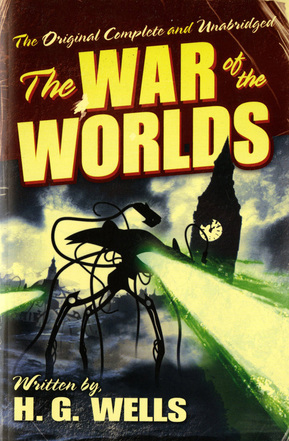
H.G. Wells’s classic tale is a minor one in the Western canon, and an outdated, reprehensible one at that.
So why bother reading about such old books or news?
The Left’s long march of destruction through Western Civilization has distorted and maligned so much of value. To understand our perilous situation we need to understand how it all went wrong. Culture is indeed upstream of politics.
Looking at older works including “classics” with clarity, that is, without the fogged goggles of wokism and other false narratives, may help.
‘NO AD’ subscription for CDM! Sign up here and support real investigative journalism and help save the republic!‘
Upfront I should admit I have never seen much value in science fiction, even before I was born again. Even less so after. In fact, I suspect it appeals primarily as a hole-filler for the God-less. More on that later.
The introduction to this Signet Classic edition of The War of the Worlds starts out with a bang: “The War of the Worlds is the most famous science fiction every published.” That kind of over-the-top assertion invites questions. What about Mary Shelley’s Frankenstein, published 80 years earlier, and certainly a far greater and enduring franchise than any Martian attack? (I would also argue of greater interest, as it lays out the risks of monkeying around with hybrid humans.)
For those unfamiliar with the first ET-go-home tale, the quiet London suburb Woking (what a contemporary name!) has its slumber interrupted by a projectile from Mars, the first of many “cylinders” containing not-so-nice Martians refugees looking for a habitable place to escape to. Earthlings, here at the center of a British Empire at its peak power, are a bit too smug (that normalcy bias gets us every time!) and no match for the Martians’ superior technology.
Published in 1898, the book’s science is fantastical. First, the cylinder impacts on landing are far less than that of meteor of similar size. Second, the idea of not only life, but advanced life, on Mars is now ludicrous. (Especially with Matt Damon there.)
The unnamed narrator, instead of bemoaning the coming heat death of the universe, instead flips the entropic principle to the opposite: death by cold. He claims early on:
The secular cooling that must someday overtake our planet has already gone far indeed with our neighbor. [p.2]
Take that, climate change paranoics!
Wells, an atheist, was clearly impacted by Darwinism, still somewhat fresh in its intellectual ruin of human thinking and modern civilization. The narrator mentions natural selection a handful of times, and repeatedly theorizes how the Martians could only look upon humans as humans do upon ants: as a superior species in the not always slow march of evolution. (Laughably, sudden leaps in evolution is now called punctuated equilibrium, as Darwinism has so obviously failed due to lack of evidence in the fossil record.)
As anyone with only a passing understanding of “natural selection” knows, it works through the “survival of the fittest.” Both terms are intellectually vacuous and now universally held. (Nature doesn’t “select” anything, neither does “chance”; “survival of the fittest” is a nearly meaningless tautology, as only the fittest survive and the fittest are those that survive.)
Yet in this brave new world where God is dead (per Frederick Nietzsche in 1882) and chance rules, where is there any room for “moral ideas,” as morality presumes a divine source? How can chance have come up with moral values in an, after all, meaningless, bleak universe?
Perhaps trendy at the time, Wells is riffing on such survival of the fittest nonsense, in an emotive fashion pointing out how animals must suffer under human domination and indifference.
One can call the book a crooked kind of morality tale, the logical extension of evolutionary fictions and syllogisms. This may explain why Wells dehumanizes all of his characters by leaving them nameless, creating stereotypes (such as his hateful depiction of the curate) and archetypes rather than flesh and blood personalities.
With so much of Wells’s book outdated, uninteresting, and in the end unenlightening, modern critics have tried to resurrect it by extrapolating from one passage in which the narrator derides the British Empire’s colonial expansion:
And before we judge them [the Martians] too harshly, we must remember what ruthless and utter
destruction our own species has wrought, not only upon animals, such as the vanishing Bison and the Dodo, but upon its own inferior races. The Tasmanians, in spite of their human likeness, were entirely swept out of existence in a war of extermination waged by European immigrants, in the space of fifty years. Are we such apostles of mercy as to complain if the Martians warred in the same spirit? [p.7]
You see? Wells was an anti-imperialist from the start, and this discovery makes the book trendy and relevant again. This modernist slant is quite amusing in its own right. Isn’t imperialism itself just “survival of the fittest” on a grand scale? Who can argue against it, especially now that God is dead and there are no fixed, universal values?
But, hey, the Martians believe in evolution too (so let’s not “judge them too harshly”):
The intellectual side of man already admits that life is an incessant struggle for existence, and it would seem that this too is the belief of minds upon Mars. [p.7]
To give him credit, Wells is prescient in several areas: the dehumanizing effect on humanity of galloping technological advances, and the onset of our current transhumanist push to genetically manipulate humans to make hybrid superhumans. The Martians become super-Martians inside bigger-body killing machines.
The other mildly interesting element to the book is how bacteria eventually defeats the Martians: not having been exposed to earthly dirt since childhood, they are killed off by the lowly microbe.
The world was recently shut down by a lowly microbe manufactured between the bioweapon labs of North Carolina and Wuhan. Its advance across all our political and geographic landscapes caused a panic not unlike the Londeners fleeing their doomed capital.
But, instead of allowing our natural immunity to battle it, we blindly agreed to all sorts of rights-destroying measures and experimental gene therapies. This round it didn’t take death-machine Martians to defeat humanity (at least temporarily), but only a lowly microbe backed by plenty of propaganda and irrational reactions to it.
The biblical truth is that we are not evolving at all (into the next level of gods or any other), but devolving as “the whole creation groaneth” under the burden and death-march of sin. Those who love to speculate about science fictions appear to thirst after the fantastical and supernatural, especially when they lack a relation with God.
The actual war of the worlds is between Western Civilization – founded on the word of God – and Leftist tyranny. The Martians are with us and they are legion. Perhaps we should pay more attention to them and how they took over.
Ben Batchelder is the author of four extended travel yarns and recently became the Faith Division Leader, Miami-Dade, for County Citizens Defending Freedom. For more hard-hitting book reviews, visit his author site benbatchelder.com





















